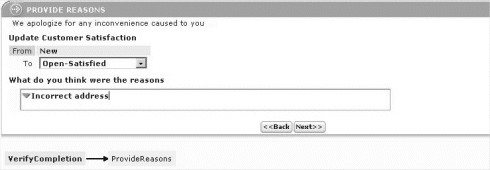
 Screen
flow
Screen
flow
 Screen
flow
Screen
flowC-1112 Many computer input procedures are most effectively handled by presenting a user with a series of simple forms that each require only one or a few questions to be answered. After submitting a form, a user receives with another simple form (with more questions) that may depend on previous answers. At any point, users can backtrack to review, or change, previous answers.
Process Commander can support such interactions with screen flows, a flow rule with specific settings.
Three runtime presentations are available to allow users to navigate within a screen flow execution at runtime:
 Tabs for both
completed and future tasks (that are marked as entry points) appear at
the top of the action area. Completed tasks contain with a check
mark.
Tabs for both
completed and future tasks (that are marked as entry points) appear at
the top of the action area. Completed tasks contain with a check
mark.To see and interact with an example flow that uses the breadcrumbs
control, select![]() > Integration > Import > Rule from File. byrnb 2/25/10
> Integration > Import > Rule from File. byrnb 2/25/10
To see and interact with the tabbed presentation, select![]() > Process and Rules > Find Rules > Find by a Custom Field. byrnb 2/25/10
> Process and Rules > Find Rules > Find by a Custom Field. byrnb 2/25/10
The standard flow rule PegaSample-CustomerRequest.CustomerFeedback provides another screen flow example. For example, these flow actions appear in one sequence of use of this rule:

Second:

Third:
 Notes
Notes
![]() To make a screen flow, create a new flow rule and
select
To make a screen flow, create a new flow rule and
select ScreenFlow in the Template
field.
![]() A screen flow rule cannot be a starter flow rule. Use
a regular flow to create the work object. Then call the screen flow as a
subflow.
A screen flow rule cannot be a starter flow rule. Use
a regular flow to create the work object. Then call the screen flow as a
subflow.
![]() The standard harness rule
Work-.PerformScreenFlow is by default used to present the
assignments in a screen flow rule. You can override this rule; the
standard harness rules Work-.TabbedScreenFlow and
Work-.TreeNavigation provide alternative presentations.
The standard harness rule
Work-.PerformScreenFlow is by default used to present the
assignments in a screen flow rule. You can override this rule; the
standard harness rules Work-.TabbedScreenFlow and
Work-.TreeNavigation provide alternative presentations.
![]() A screen flow rule must have at least one task marked
as entry point. Typically, screen flow rules have multiple tasks
marked as entry points; these are places in the flow that a user can
return to using the Back button.
A screen flow rule must have at least one task marked
as entry point. Typically, screen flow rules have multiple tasks
marked as entry points; these are places in the flow that a user can
return to using the Back button.
![]() A screen flow can operate on a temporary work object,
one that is never saved to the database. C-1884/KHATV
clinic/03/01/05
A screen flow can operate on a temporary work object,
one that is never saved to the database. C-1884/KHATV
clinic/03/01/05

|
entry point, starter flow rule, temporary work object |

|
About
Flow Rules
Flow rules — Visio Editing — Screen Flows |